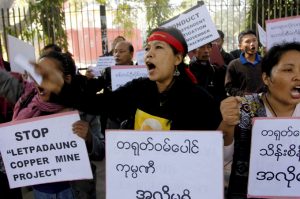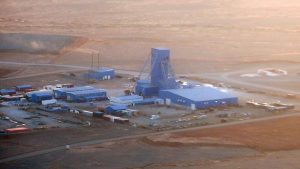Memo #216
By Brandon Miliate – bmiliate [at] gmail.com
 Protests against the Letpadaung copper mine in northwestern Burma began last year in reaction to forced relocation and environmental concerns. The Burmese government’s decision in 2011 to halt the Myitsone Dam project in the face of public concern about the project and Chinese economic influence more generally points to new responsiveness to public opinion. Yet the liberalizing political system in Burma/Myanmar begins from a context forged in decades of top-down military rule. Protest may be tolerated, but the politicians can still decide when and how to listen.
Protests against the Letpadaung copper mine in northwestern Burma began last year in reaction to forced relocation and environmental concerns. The Burmese government’s decision in 2011 to halt the Myitsone Dam project in the face of public concern about the project and Chinese economic influence more generally points to new responsiveness to public opinion. Yet the liberalizing political system in Burma/Myanmar begins from a context forged in decades of top-down military rule. Protest may be tolerated, but the politicians can still decide when and how to listen.
In the case of Letpadaung, few politicians in Burma/Myanmar are supporting the resistance. Indeed, even Aung San Suu Kyi urged protesters to drop their opposition in March, saying that the Chinese firm Myanmar Wanbao Mining Ltd. had agreed to ensure local development and environmental safety.
Mongolia’s Oyu Tolgoi in South-Gobi Province has the potential to become one of the world’s largest copper mines. On-going opposition throughout the country is not against the mine itself; rather the criticism focuses on its predominantly foreign ownership (currently the Mongolian government holds 34% with Australia-based Rio Tinto owning the remainder), the employment of foreign nationals (mainly Chinese) and allegedly weak environmental protections. While management was a key concern in Oyu Tolgoi, opposition to Chinese-owned Chalco’s bid for majority ownership in South Gobi Resources was based more centrally on tensions regarding overwhelming Chinese influence in Mongolia’s economy.
In contrast to Burma/Myanmar, Mongolian politicians have been eager to increase their own approval ratings by drumming up “resource nationalism.” Mongolian political elites operate in a well-established democracy where votes matter most, making mining companies a convenient scapegoat.
About the Author:
Brandon Miliate recently completed his M.A. in Asia-Pacific Policy Studies at The University of British Columbia, and will be starting a PhD in Political Science at Indiana University- Bloomington this August.

Demonstrators in this December 2012 protest against a Chinese-funded copper mine project were reportedly dispersed with overwhelming force, including incendiary bombs.
Links:
- Stop Protests against Copper Mine, Suu Kyi tells Communities, The Irrawaddy, March 2013
- Wanbao welcomes Inquiry Commissions Verdict, The Irrawaddy, March 2013
- Geography Rules: Why Mongolia’s China Mining Strategy is a Mistake, Wall Street Journal Bogs, September 2012
- Why Mongolia’s China Mining Strategy is NOT a Mistake, Mongolia Today Blog, (by Jargalsaikhan Mendee), September 2012

[…] The Politics of Mining in Mongolia and Burma/Myanmar – сравнение политики добычи ископаемых в Монголии и Мьянме. Короткая и малоинформативная, но постановка вопроса сама по себе интересна. Поделиться:по электронной почтеПечатьFacebookTwitterGoogle +1 […]
[…] on Myanmar in his dissertation work. Brandon in particular wrote an Asia Pacific Memo on “The Politics of Mining in Mongolia and Myanmar” earlier this year. Also, President Elbegdorj was just on a state visit to Myanmar earlier in […]
[…] not to mention governments eager to access these reserves. However, as I pointed out in a previous article, both governments are also keen to balance international investors’ influence in the economy and […]